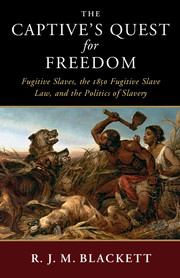 The Captive's Quest for Freedom
The Captive's Quest for Freedom from PART II - FREEDOM'S FIRES BURN
Published online by Cambridge University Press: 19 January 2018
“I find myself in a Position to address you a few lines and I hope that they may find you in as good health as I am myself in.” There is nothing unconventional about this opening salutation, except that it was written by a slave to his master soon after he escaped. It is, however, unusual in other important ways: the author clearly meant to thumb his nose at his master, to demonstrate his capacity for independent action, and to assert his commitment to freedom. But this sort of communication, written so soon after an escape, ran the risk of destroying the best laid plans. That it did not says something about the person who executed what, by any measure, was a masterful plan of escape from slavery in 1853. Written by Henry W. Banks to William M. Buck, a forty-three-year-old slaveholder of Front Royal in the Shenandoah Valley of Virginia, the letter was ostensibly mailed from New York on February 15, 1853. Buck had hired Banks in 1849 from his owner, Edward W. Massey, who lived a short distance from Front Royal. Evidently, Banks had requested the move so he could be near his wife. But he may have had other plans. Less than two years after the transfer, Massey got word that Banks was planning to escape. Massey had him jailed, but Buck intervened and had Banks released, confident that the rumors were baseless. In April 1852, Massey got wind of another planned escape and this time sold Banks to a local slave trader. Again, Buck came to Banks's defense: family connections, he predicted confidently, would keep Banks close to home. To convince Massey that there was nothing to the latest rumor, Buck agreed to post a security of $800 should Banks escape before the expiration of the contract they had renewed every year since 1849. In less than a year, Banks was gone – where to no one knew. Massey was convinced that he had fled with his brother Landon and despaired of ever retaking him. His “smartness,” Massey predicted, ensured he would not be captured.
To save this book to your Kindle, first ensure [email protected] is added to your Approved Personal Document E-mail List under your Personal Document Settings on the Manage Your Content and Devices page of your Amazon account. Then enter the ‘name’ part of your Kindle email address below. Find out more about saving to your Kindle.
Note you can select to save to either the @free.kindle.com or @kindle.com variations. ‘@free.kindle.com’ emails are free but can only be saved to your device when it is connected to wi-fi. ‘@kindle.com’ emails can be delivered even when you are not connected to wi-fi, but note that service fees apply.
Find out more about the Kindle Personal Document Service.
To save content items to your account, please confirm that you agree to abide by our usage policies. If this is the first time you use this feature, you will be asked to authorise Cambridge Core to connect with your account. Find out more about saving content to Dropbox.
To save content items to your account, please confirm that you agree to abide by our usage policies. If this is the first time you use this feature, you will be asked to authorise Cambridge Core to connect with your account. Find out more about saving content to Google Drive.